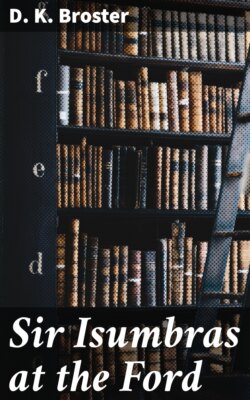Читать книгу Sir Isumbras at the Ford - D. K. Broster - Страница 4
На сайте Литреса книга снята с продажи.
(1)
Оглавление"And well ye ken, Maister Anne, ye should hae been asleep lang syne!" said Elspeth severely.
Master Anne—M. le Comte Anne-Hilarion de Flavigny—gave a little sigh from the bed. "I have tried . . . if you would say 'Noroway,' perhaps? . . . Say 'Noroway-over-the-foam,' Elspeth, je vous en prie!"
"Dinna be using ony of yer French havers tae me, wean!" exclaimed the elderly woman thus addressed, still more threateningly. "Aweel then. . . . Ye're no' for 'True Thomas' the nicht?"
The silky brown head on the pillow was shaken. "No, please. I like well enough the Queen of Elfland, but best of all 'Noroway-over-the-foam' and the shoes with cork heels."
Elspeth Saunders grunted, for there was something highly congenial to her Calvinistic soul in that verse of 'Thomas the Rhymer' which deals with the Path of Wickedness—'Yon braid, braid road that lies across the lily leven,' and she was accustomed to render it with unction. However, she sat down, took up her knitting, and began:
"'The king sat in Dunfermline toun
Drinking the blude-red wine,'"
and the little Franco-Scottish boy in the curtained bed closed his eyes, that he might seem to be composing himself to slumber. In reality he was seeing the pictures which are set in that most vivid of all ballads—Sir Patrick Spens receiving the King's letter as he walked on the seashore, the sailor telling of the new moon with the old in her arms (a phenomenon never quite clear to the Comte de Flavigny), the storm and shipwreck, and the ladies with their fans, the maidens with their golden combs, waiting for those who would never come back again.
"'And there lies gude Sir Patrick Spens
Wi' the Scots lords at his feet,'"
finished Elspeth. The knitting needles proceeded a little with their tale, then they too stopped.
"Losh! the bairn's asleep already!" thought Mrs. Saunders, looking over her spectacles. She tiptoed from the room.
Yet although Anne-Hilarion's long lashes lay quietly on his cheeks he was not by any means asleep, and under those dark curtains he watched, not without a certain drowsiness, the gigantic shadow of his attendant vanish from the wall. The night-light shed a very faint gleam on the vast mahogany wardrobe, whose polished doors reflected darkly much that passed without, and suggested, to a lively imagination, all kinds of secret happenings within. It also illumined Anne's minute garments, neatly folded on a chair, his high-waisted blue kerseymere pantaloons on the top of the pile, and the small coat, into which Elspeth had been sewing a fresh ruffle, over the back. This much of his apartment could Anne see between the chintz curtains, figured with many a long-tailed tropic bird, which hung tent-like from the short pole fixed in the wall above his pillow. But he could not see Mme. d'Aulnoy's fairy-tales, in their original French, which were lying face downwards on the floor not very far away (and which he would be scolded for having left about, when they were found to-morrow); nor the figure of Notre Dame de Pontmain, in her star-decked robe of blue and her long black veil, holding in her hands not her Son but a crucifix—the figure which M. l'Abbé, being of Laval, her country, had given to the little boy. For this image had a knack of disappearing entirely when Anne's father the Marquis was away, since, as may readily be supposed, it found no favour in the eyes of Mrs. Saunders, and was an even more violent irritant than all 'the bairn's Popish exercises,' to which she would so much have liked to put an end. That she might see as little as possible of the heathen idol she had banished it, with its bracket, to an obscure corner of the room, over the discarded high nursery-chair in which Anne, at six years old, no longer took his meals. The fact of the image's being in the room at all just now showed that the Marquis was at home . . . for to him, as to his small son, in this April of the year 1795, the solid Cavendish Square house was home, though it belonged to neither of them. Anne-Hilarion, for his part, could remember no other.
